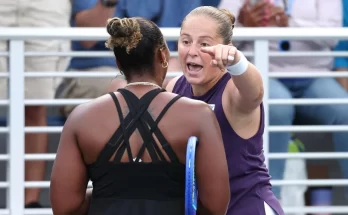McDavid couldn’t contain his emotions during the postgame.
Connor McDavid couldn’t hold back. The weight of expectation, the magnitude of the moment, the years of near-misses and frustration—all of it seemed to crash down on the Edmonton Oilers captain in the postgame press conference. His voice trembled, his eyes glistened, and his usually stoic demeanor gave way to a raw, vulnerable version of a player who has carried an entire franchise on his back for nearly a decade. For once, the composed and controlled face of the Oilers let the world see just how deeply this run, this team, and this city meant to him.
McDavid is often compared to legends, hailed as a generational player, and described as the best hockey player in the world. On the ice, he plays with a supernatural blend of speed, skill, and vision, making the impossible look routine. But in that moment, away from the bright lights of the rink and stripped of the armor that comes with a helmet and a jersey, he was simply human—a young man confronting the emotional toll of chasing greatness and carrying the hopes of a hockey-mad city.
The questions from reporters came quickly, but McDavid’s pauses spoke louder than any answer. He looked down often, struggling to compose his thoughts. Every word seemed to be weighed carefully, as though each syllable bore the responsibility of representing his teammates, his coaches, and the city of Edmonton. And when he finally did speak, his words reflected a deep emotional connection not just to the game, but to the people who’ve believed in him and the journey that brought them to this point.
“I don’t really know what to say,” McDavid began, his voice breaking slightly. “This group… we’ve been through a lot together. We’ve had our ups and downs, but we always believed. And to come this far, to get this close—it’s tough.”
That sense of heartbreak was palpable. The Oilers had clawed their way through a grueling postseason, overcoming adversity, silencing critics, and proving that they belonged on the sport’s biggest stage. Each victory was a triumph of will and unity. Each comeback a testament to their resilience. McDavid was the engine behind it all, leading by example with dazzling play and quiet, unwavering determination.
But in the end, it wasn’t enough. Whether it was missed opportunities, costly mistakes, or simply being outplayed in the most critical moments, the dream had slipped just out of reach. And McDavid, ever the competitor, felt the sting more than anyone.
“I’m proud of our group,” he continued. “We battled. Everyone gave everything they had. There’s nothing more you can ask for as a captain. But that doesn’t make this any easier. We wanted to bring a Cup back to Edmonton. We wanted it so bad.”
What makes McDavid’s pain so resonant is that it extends beyond the outcome of a game or a series. It’s about legacy. It’s about fulfilling the promise that’s shadowed him since he was drafted first overall in 2015. From the moment he put on that Oilers jersey, he was expected to revive a franchise that had known only fleeting success since the glory days of Gretzky and Messier. He didn’t just inherit a team—he inherited a city’s hope.
And he embraced it. Year after year, McDavid has pushed himself to new heights. He’s led the league in points multiple times, captured Hart Trophies, and broken records that stood for decades. But postseason success remained elusive. The deeper he and the Oilers got into the playoffs, the heavier the burden became. Every game was a referendum on his greatness. Every loss, a reminder of what was still missing.
This year felt different. The team was deeper, more balanced, more battle-tested. McDavid himself had grown—not just as a player, but as a leader. His game had evolved to include more than highlight-reel rushes and jaw-dropping goals. He blocked shots, killed penalties, and made unselfish plays that don’t always show up on the stat sheet. He set the tone, and his teammates followed.
Yet, despite all the growth and all the effort, they fell just short. That cruel finality hit McDavid hard. As he sat in front of the microphones and cameras, he didn’t hide from it. He didn’t sugarcoat it. He wore his heartbreak openly.
“You work your whole life for this,” he said. “You dream about it as a kid. You sacrifice so much, your family sacrifices so much. And to come this far and not finish the job—it’s just gutting.”
Those words carried the weight of not just a season, but a journey. Behind every moment of brilliance on the ice is a lifetime of hard work. Behind every shift, every pass, every goal, is a relentless pursuit of something bigger than yourself. For McDavid, that “something bigger” has always been about team success, not individual accolades. It’s about lifting the Stanley Cup, not lifting personal trophies. That’s why the pain runs so deep.
Around him, his teammates echoed similar sentiments, but none wore it more visibly than McDavid. He’s the face of the franchise, the heartbeat of the team. He sets the standard, and in turn, he shoulders the responsibility. That’s the price of greatness. It’s a heavy burden, but one he’s never shied away from.
Despite the heartbreak, McDavid remained gracious. He praised his teammates, commended the opposition, and thanked the fans for their unwavering support. Even in the midst of personal disappointment, he found space for gratitude.
“I want to thank the fans,” he said. “They’ve been unbelievable all year. They stuck with us through the highs and the lows. They believed in us, and we felt that every single night. We wanted to win it for them. We still do.”
That final note of hope hinted at what comes next. While the sting of defeat will linger, it won’t define McDavid. If anything, it will fuel him. The best athletes in the world don’t just rise in victory—they rise in adversity. They use heartbreak as motivation, as a reminder of what’s still worth chasing.
For McDavid, that chase isn’t over. His journey, though painful in this moment, is far from complete. There’s still unfinished business, still dreams to realize, still banners to raise. And if there’s one thing that was clear in that emotional press conference, it’s that he’s not going to stop until he brings a championship to Edmonton.
As he stood up to leave, his eyes still glassy, McDavid gave one last look to the assembled media. No more words were needed. The emotion on his face said it all. He cares. Deeply. And that, more than anything else, is what makes him not just a great player, but a great leader.
When history looks back on Connor McDavid’s career, it will remember the goals, the assists, the records, and the accolades. But it will also remember moments like this—moments of raw honesty, of human vulnerability, of passion so deep that it spills over even in defeat. It’s those moments that define the soul of a competitor. And McDavid, through it all, has proven that his soul burns as fiercely as any who have ever played the game.



